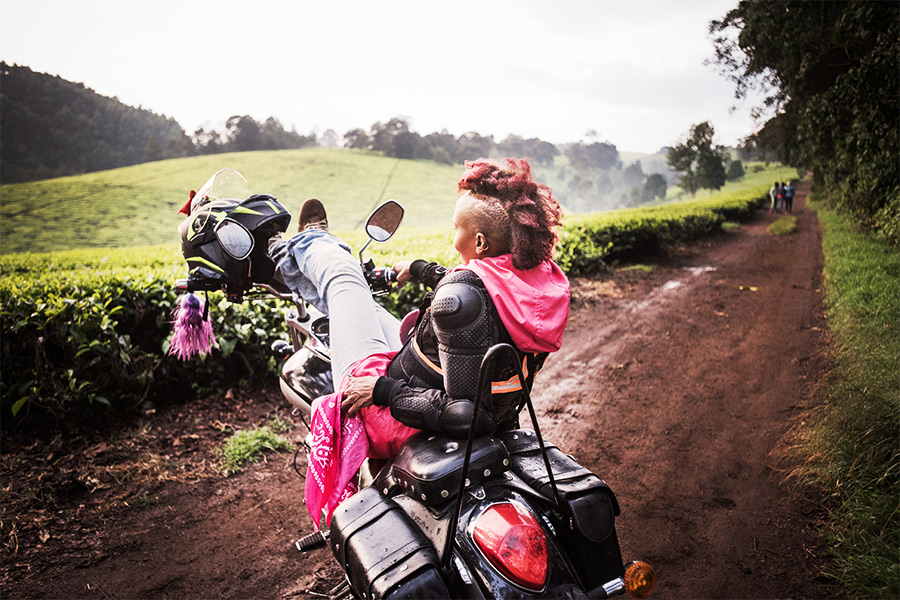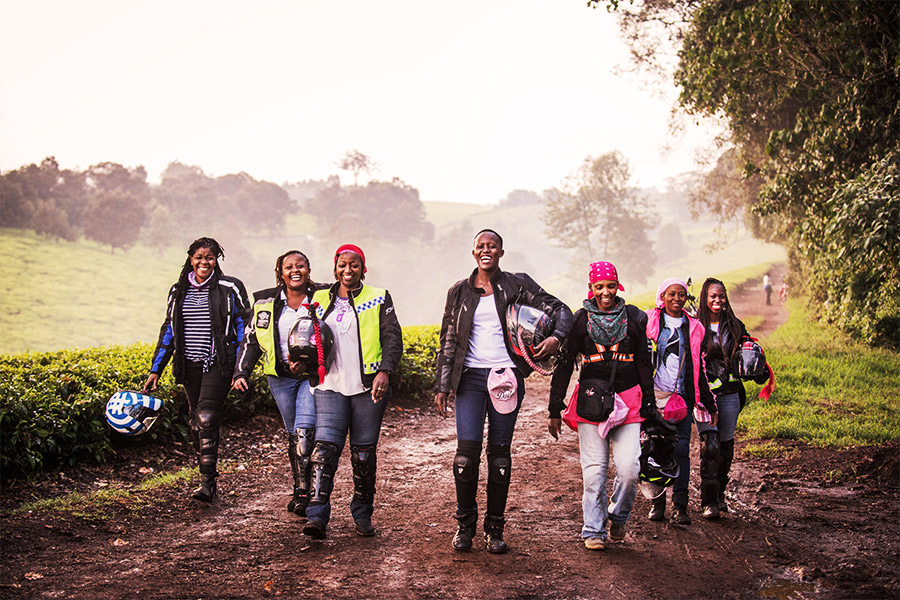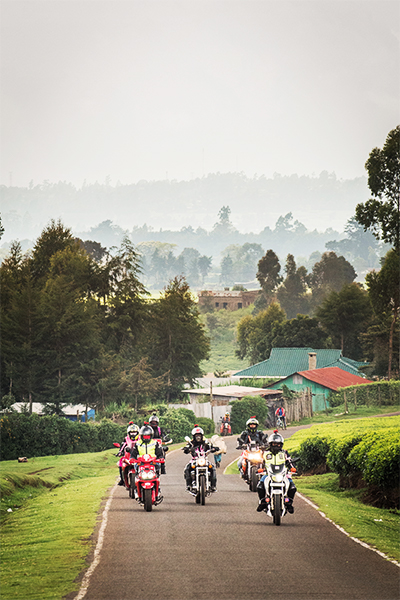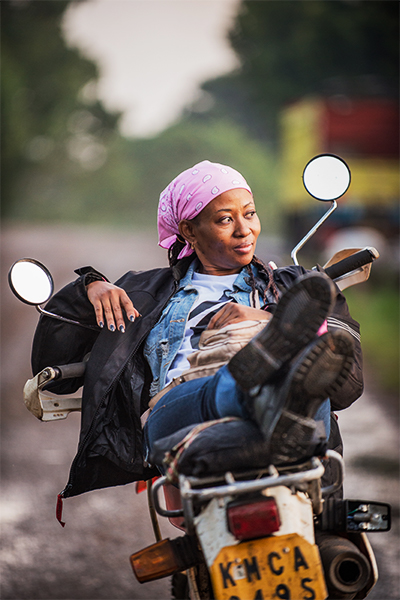Freedom riders: Kenya’s all-female biker club
Members of Piki Dada, a Kenyan biker club for women, share stories of sisterhood, stereotypes and the thrill of the open road
A thick carpet of tea shrubs sprawls into the hills surrounding Limuru, some 40km north-west of Nairobi, a vast expanse of green, broken only by a grey, winding road. In the distance and out of view, the growl of engines fills the air, followed moments later by the sight of seven bikes whizzing around a bend.
The bikes close in, their headlights beaming in perfect formation, like a presidential convoy. There are flashes of pink in the riders’ outfits and, attached to their helmets, multicoloured ombre ponytails whip in the wind. They stop their bikes and dismount, though not with the smooth motion of a femme fatale in a Hollywood movie.
“The hills are alive with the sound of nduthis!” sings one of the bikers, running gleefully into a field. (Nduthi is the Nairobi-Swahili slang for “motorbike”.) A passing long-haul truck driver honks twice and gives them a thumbs up.
Motorbikes are no novelty in Kenya, with boda boda (motorcycle taxis) being one of the go-to means of transport. Even in key cities like Nairobi, they are often preferred because of their ability to weave through the city’s infamous traffic. However, should you wave down a boda boda from the side of a road, it is highly unlikely that the person riding it will be a woman.

Nyambura Njugune at Kiambethu Tea Farm

Piki Dada, one of a handful of female motorbike groups in Kenya, is aiming to challenge social norms that dictate motorcycling to be a man’s domain. The group’s members range widely in age and ability, but you can clearly see the bond between them. Here, beside the plantation, they are full of good-natured banter and laughter, their faces beaming with the confidence of women doing exactly what they love.
Along with their regular rides, the club’s 14 members often hang out together, and take care of each other when the need arises – which can mean anything from offering practical support to simple advice. “Many of us are mothers who need to be present for our families,” says founding member Patience Mehta, who also goes by the name of Peanut, due to her petite frame.
“Sometimes, the group gets together for a ride, but you may not be able to go because you can’t find a nanny for your kids on that day. You need someone to support you, or just tell you that it’s okay to stay indoors and be a mum.” She pats the tank of her bike, a Hero Karizma ZMR 223cc, which she has named Babezy.

The Piki Dada bike club from left to right: Hope Makwali, Sylvia Thiong'o, Ago D'Costa, Anne Hellen Githengu, Nyambura Njuguna, Patience Mehta (aka Peanut), and Bettina Bogonko

Standing nearby is Agi D’Costa, who rides a Puzey G-Wizz 150cc scooter. A mother of three, D’Costa has worked in the airline industry for 30 years and has long struggled to find time for herself. But a few years ago, with her kids grown up and leaving the nest, she found herself looking for a hobby.
While most people in her position might have taken up gardening or charity work, D’Costa decided to co-found an all-female motorcycle club. Her husband and kids supported her decision without question, she says, but Kenyan society – still wedded to the idea that motorbike riding is a manly pursuit – was another matter entirely.
“People never believe that I own my bike, let alone ride it,” D’Costa says. “When I go upcountry, I have had aunties telling me off, saying I will intimidate my husband.” Each Piki Dada member has stories of being called names, or being told they will never find a husband. These comments sometimes come from men, and sometimes from other women. “As a woman riding a motorbike, people are sure that there must be something wrong with you,” says Mehta. “You’re either a rebel, a drug user, or just crazy.”
As a woman riding a motorbike, people are sure that there must be something wrong with you. You’re either a rebel, a drug user, or just crazy.
Anne Hellen Githengu, a tall, statuesque woman, rides a bright-orange Honda XR 250cc nicknamed Vin, which she took on a 480km road trip from Nairobi to Mombasa last year. While she says the perception of female bikers has improved over the last few years, dating can still be a bit of a challenge. “I tried going out with a man and he gave me an ultimatum to stop riding the piki-piki,” she says with a wry smile. “He even offered to buy me a car.”
Meanwhile, due to the perceived recklessness of boda boda riders, motorcyclists in general tend to be regarded as a nuisance on Kenyan roads. However, as the Piki Dada members know all too well, it is they who are more often at risk. While stuck in traffic recently, D’Costa says by way of example, she had her foot run over by a car – only her steel-capped boots saved her toes from a painful crushing.
The group’s flashy gear, while increasing their visibility, can lead to unwanted attention: matatus (minibuses) sometimes try to race them, or boda boda riders come close to strike up conversation, both of which can lead to accidents.
Riding motorcycles can also be expensive. During our conversation, Githengu reveals that she recently bought gloves, a jacket and pants for the equivalent of around US$330. There is not a single Piki Dada member, though, who views this as a bad investment. “It’s like buying a handbag or a pair of heels: you see it, you want it, you get it!” says D’Costa, eliciting a round of laughter. Beyond the cool riding gear, there is also the cost of road trips, which have so far taken the women to places like Mombasa, Moshi, Kisumu, Kitale, Baringo and Kericho.
Right now, needing a change of scenery, the women pull away from the plantation in the direction of Nairobi. Following right behind them in a car, it is fascinating to see how much of a statement they make. People stop, stare and do double takes. A group of kids herding cows in a field raise little sticks in the air and cheer. A boda boda passenger holding a goat almost drops the animal as he leans over the rider’s shoulder to get a better look at the ponytailed helmets passing by. You can imagine his conversation over the dinner table later: “You’ll never believe what I saw today…”
When the group stops to refuel at a petrol station, a woman driving a sleek Range Rover seems enthralled by the spectacle of these high-booted, leather-clad women. She tells Mehta that she’s always wanted to ride a motorbike but didn’t know women could do it. Bettina Bogonko, one of the youngest in the group, points out that she was motivated to start riding because she saw a woman on a motorbike.

Piki Dada in convoy on Kiambu Road

Patience Mehta kicks back biker style
“When you’re a beginner, some groups won’t let you ride with them,” she says, “but Piki Dada sisters look out for each other; they gave me the confidence to navigate Kenyan roads.” Before pulling away, the Range Rover driver tells the group that she’s going to find herself an instructor so that she can learn to ride, too.
While some might view Piki Dada as beacons of female empowerment, the members of the group express far simpler, and far more personal, reasons for loving the motorcycle life. “When you’re in a car, you’re either talking to somebody or listening to music,” D’Costa says. “When I’m on my motorcycle, it’s just me and the wind. I like to be alone with my own thoughts. It’s exhilarating.”
Listening to this, Mehta smiles and nods. “If you’re going through depression and you ride,” she says, “you’re going to come out of it.”
For newbies: Oloitoktok
A border town in the foothills of Mt Kilimanjaro with great scenery. The hills of Ukambani have gentle curves known as “twisties”; bikers love these. Watch out for wildlife on the way through Tsavo National Park.
For experienced riders: Kisumu
The landscape and weather change frequently as you ride through the countryside past small towns, taking in the beauty of the Rift Valley and Naivasha on your way to this city in Western Kenya.
For the really adventurous: Samburu
For animal and nature lovers, Samburu National Reserve has plenty of wildlife. The seasonal Ewaso Ng’iro river cuts through Samburu, and the climate is hot and dry but cools down in the evening for a daredevil ride.